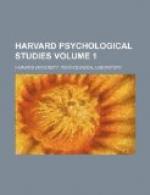Possible it would be; we might have under the sciences
of logical attitudes not only logic and mathematics
but as a subdivision of these, again, the sciences
which construct the logical system of a phenomenalistic
world—physics being in this sense merely
mathematics with the conception of substance added.
And yet we must not forget that the teleological attitudes,
to become a teleological science, must be also logically
reconstructed, as they must be teleologically connected,
and thus in this way the totality of purpose-sciences
might be, too, logically subordinated to the science
of logic. Logic itself would thus become a subdivision
of logic. We should thus move in a circle, from
which the only way out is to indicate the teleological
character of all sciences by starting not with science
but with the strictly teleological conception of life—life
as a system of purposes, felt in immediate experience,
and not as the object of phenomenalistic knowledge.
Life as activity divides itself then into different
purposes which we discriminate not by knowledge but
by immediate feeling; one of them is knowledge, that
is, the effort to make life, its attitudes, its means
and ends a connected system of overindividual value.
In the service of this logical task we connect the
real attitudes and thus come to the knowledge of purposes:
and we connect the means and ends—by abstracting
from our subjective attitudes, considering the objects
of will as independent phenomena—and thus
come to phenomenalistic knowledge. At this stage
the phenomenalistic sciences are no longer dependent
upon the teleological ones, but cooerdinated with them;
physics, for instance, is a logical purpose of life,
but not a branch of logic: the only branch of
logic in question is the philosophy of physics which
examines the logical conditions under which physics
is possible.
One point only may at once be mentioned in this connection.
While we have cooerdinated the knowledge of phenomena
with the knowledge of purposes we have subordinated
mathematics to the latter. As a matter of course
much can be said against such a decision, and the authority
of most mathematicians would be opposed to it.
They would say that the mathematical objects are independent
realities whose properties we study like those of
nature, whose relations we ‘observe,’ whose
existence we ‘discover’ and in which we
are interested because they belong to the real world.
All that is true, and yet the objects of the mathematician
are objects made by the will, by the logical will,
only, and thus different from all phenomena into which
sensation enters. The mathematician, of course,
does not reflect on the purely logical origin of the
objects which he studies, but the system of knowledge
must give to the study of the mathematical objects
its place in the group where the functions and products
of logical thought are classified. The arithmetical
or geometrical material is a free creation, and a
creation not only as to the combination of elements—that




